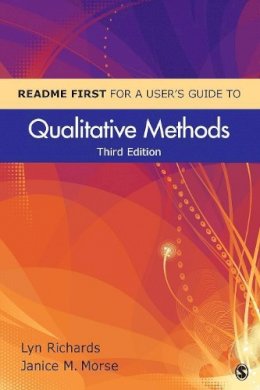About the author Lyn Richards has a highly unusual range of relationships with qualitative research. After undergraduate training as a historian and political scientist, she moved to sociology. Her early work as a family sociologist addressed both popular and academic audiences, with a strong motivation always to make the funded research relevant to the people studied, and the qualitative analysis credible to those affected. Each of her four books in family sociology was a text at university level but also widely discussed in popular media and at community level. During her tenure as Reader and Associate Professor at La Trobe University in Melbourne, she won major research grants, presented and published research papers, was a founding member of a qualitative research association and taught qualitative methods at undergraduate and graduate level, supervising Masters and PhD students. She strayed from this academic pathway when challenges with handling qualitative data in her own studies led to the development, with Tom Richards, of what rapidly became the world’s leading qualitative analysis software. They founded a research software company, in which for a decade Lyn was Director of Research Services, writing software documentation and managing international training of researchers and trainers in the methods behind the software. Designing and documenting software taught her to confront fuzzy thinking about methods, and to demand straight talking, clarity of purpose, detail of technique and a clear answer always to ‘Why would we want to do that?’ Teaching methods to thousands of researchers in dozens of disciplines in 14 countries, she saw what worked and what didn’t. From those researchers, graduates and faculty in universities and research practitioners in the world beyond, she learned their many ways of handling data, on and off computers, and their strategies for making sense of data. Handling Qualitative Data is a direct result of this experience. It offers clear, practical advice for researchers approaching qualitative research and wishing to do justice to rich data. Like her previous book, with Janice Morse, Readme First, for a User’s Guide to Qualitative Methods it strongly maintains the requirements of good qualitative research, assumes and critiques the use of software and draws on practical experience of helping researchers whose progress has been hindered by confusion, lack of training, mixed messages about standards and fear of being overwhelmed by rich, messy data. Throughout this hybrid career, Lyn continued contributions to critical reflection on new methods, as a writer and a keynote speaker in a wide range of international conferences. She has life membership of the International Sociological Association and its Methodology section. Her writing aims always to cut through barriers to high quality qualitative research and to assist researchers and teachers in making the inevitable shift to computing whilst maximizing the benefits for their research processes and outcomes. On leaving software development, she took an Adjunct Professorship at RMIT University, creating and coordinating an active, informal and splendidly supportive Qualitative Interest Group (QIG). She currently works from home, (online, of course), combining research advising with convening of an asylum seeker support group and growing roses and vegetables, all of which provide marvellous metaphors for qualitative research. Janice M. Morse, PhD (Nurs), PhD (Anthro), FAAN is a professor and Presidential Endowed Chair at the University of Utah College of Nursing, and Professor Emeritus, University of Alberta, Canada., from 1991-1996, she also held a position as professor at The Pennsylvania State University. From 1997-2007, she was the founding Director and Scientific Director of the International Institute for Qualitative Methodology, University of Alberta, founding editor for the International Journal of Qualitative Methods, and Editor of the Qual Press monograph series. She remains the founding editor for Qualitative Health Research, (now in Volume 2, Sage1), is currently editor for the monograph series Developing Qualitative Inquiry, and The Essentials of Qualitative Inquiry (Left Coast Press). Her research programs are in the areas of suffering and comforting, preventing patient falls, and developing qualitative methods. In 2011, she was awarded the Lifetime Achievement in Qualitative Inquiry from the International Center for Qualitative Inquiry, was an inaugural inductee into the Sigma Theta Tau International Nurse Researcher Hall of Fame (2010), the 5th recipient of the Episteme Award (also Sigma Theta Tau). She received awarded honorary doctorates from the University of Newcastle (Australia) and Athabasca University (Canada). She is the author of 460 articles and chapters and 19 books on qualitative research methods, suffering, comforting and patient falls.
“This text offers current thinking in the field. The authors are well-established qualitative researchers and have pulled off a great text for the beginning researcher.”
Matthew A. Eichler “The key strength of this text is the discussion and presentation of how to think about qualitative research. This is the only text that discusses the process of thinking before doing at any stage of the research project from the general idea to the writing up and submitting for publication. This kind of discussion is extremely helpful for novice or experienced researchers as it helps them to take a step back in the middle of the research process, rethink clearly and improve the project.”
Ruth Segal “This book combines the basics of qualitative research methods (why we choose qualitative over quantitative when we are trying to answer specific questions about human behavior) and the nuts and bolts of how to actually do qualitative research. I like that it explains qualitative research from conceptualization to writing up the results. Not a lot of textbooks accomplish this – they allude to a lot, but they don’t include the necessary information that this textbook includes.”
Rhonda R. Buckley “The text is very clear and well organized, and accessible for new students. In comparison to many other introductory texts, it really brings to the fore the need for theoretical and methodological coherence.”
Irina L. G. Todorova “An invaluable introduction to qualitative inquiry that emphasizes several points that I rarely find in other texts and, although somewhat subtle, they are extremely important for doing rigorous research.”
Sandra Mott

